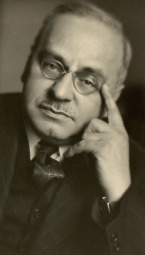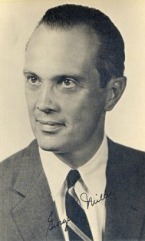David Webb's Blog
February 7, 2015
Alfred Adler: Today in the History of Psychology (7th February 1870)

Alfred Adler was born. A true legend within the discipline, Adler is rightly heralded as the first community psychologist. Decades ahead of its time and rooted in social welfare, social justice, equality and the importance of education; Adlerian psychology, also known as individual psychology still resonates as strongly as when Adler began to articulate his ideas in the early part of the 20th Century.
Feeling engaged and connected with one's community is a central tenet of Adlerian psychology. The psychological importance of "Social Interest" or "Gemeinschaftsgefühl" as Adler originally called it, is as important today as it has ever been.
Published on February 07, 2015 07:15
February 6, 2015
B. F. Skinner Science and Human Behavior: Today in the History of Psychology (6th February 1951)

B. F. Skinner self-published his classic book 'Science and Human Behavior.' Originally printed as a teaching resource for his Natural Sciences course at Harvard; this seminal text includes one of Skinner's earliest accounts of the similarity between operant selection and Darwinian natural selection in phylogeny.
The Macmillan Company published the first formal edition of Science and Human Behavior in 1953.
Published on February 06, 2015 05:05
February 5, 2015
Kent Kiehl Interview
Kent Kiehl: Great interview with psychopathy expert Kent A. Kiehl, Ph.D.
Published on February 05, 2015 08:31
February 4, 2015
Morton Deutsch: Today in the History of Psychology (4th February 1920)

Morton Deutsch was born. Professor Emeritus at Teachers College Columbia University, Morton Deutsch is a world renowned scholar within the field of conflict resolution. In a hugely influential career spanning over 50 years, Deutsch has made a lasting contribution to our understanding of distributive justice, intergroup relations, social perception and developmental social psychology.
Among his many professional honors, Deutsch received the Kurt Lewin Award in 1968, presented by the Society for the Psychological Study of Social Issues (SPSSI) for "outstanding contributions to the development and integration of psychological research and social action." In 1987 he received the American Psychological Association Award for Distinguished Scientific Contributions and in 2004 The International Society for Justice Research Award for distinguished work in the field of social justice.
Published on February 04, 2015 05:36
February 3, 2015
George A. Miller: Today in the History of Psychology (3rd February 1920)

George Armitage Miller was born. Renowned for his pioneering work in the fields of cognitive psychology, psycholinguistics, and cognitive neuroscience, Miller's classic study 'The Magical Number Seven, Plus or Minus Two: Some Limits on Our Capacity for Processing Information' published in Psychological Review in 1956, ranks among the most frequently cited journal articles in the history of psychology.
In the course of a long and illustrious career, Miller received the American Psychological Association (APA) Award for Distinguished Scientific Contributions in 1963, served as APA president in 1969, received the American Psychological Foundation Gold Medal Award for Life Achievement in Psychological Science in 1990 and was awarded the National Medal of Science in 1991, the highest scientific honor conferred in the United States.
George Armitage Miller died on July 22, 2012 at the age of 92. In a tribute published shortly after his death, Philip Johnson-Laird, who co-authored the book 'Language and Perception' with Miller in 1976 stated "As long as scientists study the mind, they will honor ideas that he was first to formulate."
Published on February 03, 2015 03:59
February 2, 2015
Henry Havelock Ellis: Today in the History of Psychology (2nd February 1859)

Henry Havelock Ellis was born. A pioneering writer within the field of human sexuality, Ellis is widely credited with introducing the terms autoeroticism and narcissism within a psychoanalytical context.
Ellis is best known for his 'Studies in the Psychology of Sex' series which he published over a number of years, consisting of six volumes i.e. 'Sexual Inversion' (1897), 'The Evolution of Modesty, the Phenomena of Sexual Periodicity and Auto-eroticism' (1900), 'Analysis of the Sexual Impulse, Love and Pain, The Sexual Impulse in Women' (1903), 'Sexual Selection in Man' (1905), 'Erotic Symbolism' (1906) and 'Sex in Relation to Society' (1910).
Published on February 02, 2015 05:29
February 1, 2015
Granville Stanley Hall: Today in the History of Psychology (1st February 1844)

Granville Stanley Hall was born. A profoundly influential figure in the development of modern psychology, Hall earned the first Ph.D. degree in psychology to be awarded in the United States under the supervision of William James at Harvard University.
Among his many pioneering contributions, Hall established The first formal psychology research laboratory in the U.S during his tenure as Professor of Psychology and Pedagogics at Johns Hopkins University in 1883; was one of the 31 founding members of the American Psychological Association in 1892, serving as inaugural President and he co-founded the Journal of Applied Psychology in 1917.
Renowned as an exceptional teacher and supervisor, Hall's most notable students included Lewis Terman, James McKeen Cattell, John Dewey and Joseph Jastrow.
Published on February 01, 2015 04:14
January 31, 2015
Neal E. Miller Biofeedback: Today in the History of Psychology (31st January 1969)

Neal E. Miller's article "Learning of Visceral and Glandular Responses," was published in the prestigious journal Science. A seminal publication within the then emerging interdisciplinary field of biofeedback, the article outlined instrumental conditioning of autonomic responses.
This classic paper was part of the groundbreaking brain and behavior research Miller conducted as head of a laboratory of physiological psychology at the Rockefeller University, New York.
Published on January 31, 2015 08:29
January 30, 2015
Joseph Jastrow: Today in the History of Psychology (30th January 1863)

Joseph Jastrow was born. A true pioneer in the early days of modern psychology, Jastrow earned his Ph.D., from the first psychological laboratory established in the United States at Johns Hopkins University in 1886; and was one of the original 31 members of the American Psychological Association founded in 1892, serving as president in 1900. Following his appointment by the University of Wisconsin in 1888, Jastrow established what would become the oldest continuously supported psychology department in the U.S.
Joseph Jastrow was instrumental in popularizing psychological science among the general public. He regularly wrote for leading magazines such as Popular Science Monthly, Cosmopolitan, Scribner's and Harper's Monthly; conducted tests of touch, movement and memory on Helen Keller at the World's Fair in Chicago in 1893 and became one of the very first radio psychologists when he began hosting a series of talk shows for the NBC studios network.
Published on January 30, 2015 04:00
Seeing is Not Remembering
Seeing is Not Remembering: Fascinating article by Victoria M. Indivero, Science Writer at Penn State University.
Published on January 30, 2015 02:24



